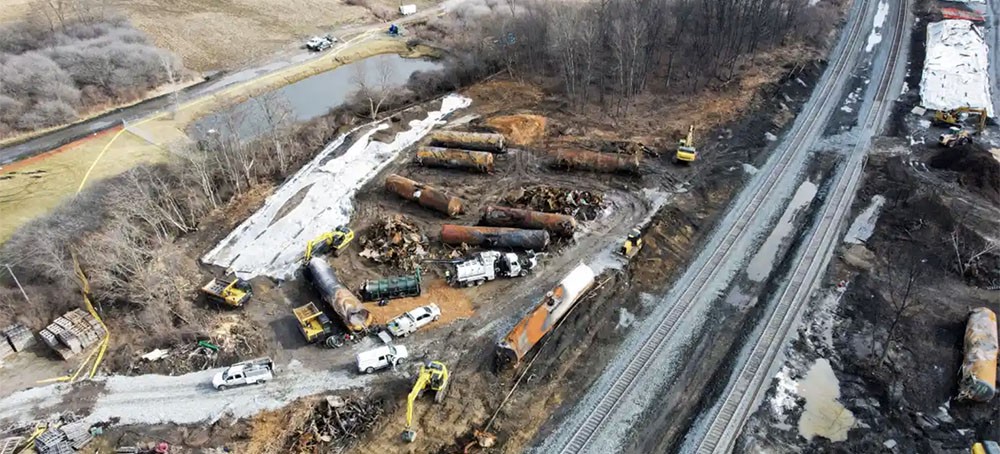Live on the homepage now!
Reader Supported News
Soil is being sent to a nearby incinerator with a history of clean air violations, raising fears the chemicals will be redistributed
The new plan is “horrifying”, said Kyla Bennett, a former Environmental Protection Agency (EPA) official now with the Public Employees for Environmental Responsibility non-profit. She is one among a number of public health advocates and local residents who have slammed Norfolk Southern and state and federal officials over the decision.
“Why on earth would you take this already dramatically overburdened community and ship this stuff a few miles away only to have it deposited right back where it came from?” Bennett asked.
Incinerating the soil is especially risky because some of the contaminants that residents and independent chemical experts fear is in the waste, like dioxins and PFAS, haven’t been tested for by the EPA, and they do not incinerate easily, or cannot be incinerated.
A Norfolk Southern train carrying vinyl chloride used to produce PVC plastic derailed on 3 February in the small industrial town of 4,700 people, located at the edge of the Appalachian hills in Ohio.
As the fire threatened to ignite tankers full of the chemical days later, emergency responders, fearing a major explosion, conducted a controlled burn of the substance.
Environmental researchers say the combustion of vinyl chloride almost certainly created dioxins, a highly toxic chemical that can remain in the environment for years. However, the EPA has resisted calls to test for it, and the agency removed from its website the results of its in-depth soil analyses, so it’s unclear which chemicals are in the soil.
Chemicals like dioxins must be incinerated at extremely high temperatures, and the combustion of some substances can be difficult or unpredictable during incineration, said Carsten Prasse, an environmental health professor at Johns Hopkins University who focuses on risk science. Those issues are generating uncertainty about the plan’s safety.
“My concern is basically do we just translate the issue that’s right now in the soil into another medium by blowing it into the air?” he asked. “That is not necessarily the case, but I’m not sure that we can exclude this at this point, so it is an issue.”
The ground also likely contains PFAS, informally called “forever chemicals” because they do not naturally break down, and no human-made method to destroy the compounds has been fully developed.
“The effectiveness of incineration to destroy PFAS compounds and the tendency for formation of fluorinated or mixed halogenated organic byproducts is not well understood,” the EPA has written.
Still, it is putting residents’ health at risk by sending potentially PFAS-contaminated soil to the incinerator, Bennett said.
“The most important thing in my mind is the human health and health of the environment, so right now that should be priority number one, and things like this fly in the face of basic human decency and science,” she added.
The incinerator, owned by Heritage Thermal Services, is already burning PFAS waste from the Department of Defense, which prompted a federal lawsuit from a coalition of local environmental groups. Heritage also faced an investigation and enforcement action from the EPA in 2015 after officials determined the facility had violated the Clean Air Act nearly 200 times between 2010 and 2014.
Among the chemicals that had been released at dangerous levels was dioxin, and among the issues cited by the EPA were a failure by Heritage to maintain a required minimum temperature, raising questions about whether the facility can handle more dioxin and PFAS waste.
The facility has also recorded air quality violations in eight of the last 12 quarters, EPA records show.
Local environmental groups have been fighting with Heritage over its emissions since the incinerator was built in the 1990s, said Amanda Kiger, director of River Valley Organizing. She has been assisting residents in East Palestine about 15 miles north, but lives near the incinerator in East Liverpool, both of which are in Columbiana county.
“[Environmental officials] are just dumping more shit on Columbiana county,” Kiger said. “They say, ‘We already poisoned them so it doesn’t matter if we poison them more.’”
In a statement to news outlets, Heritage said it is “providing support at the site in accordance with the cleanup plan approved by government agencies with jurisdiction over the response to the event”.
East Palestine’s waste disposal has raised fresh questions about the disposal of toxic substances. Some of the waste is being sent to incinerators around Ohio, while about 1.5m gallons of wastewater is being injected into wells deep into the Earth’s crust near Houston. Deep wells can leak waste into groundwater, and are thought to cause earthquakes.
Meanwhile, some contaminated soil was shipped to a Michigan landfill with a history of discharging PFAS into a public sewer system. A state-of-the-art incinerator in Arkansas is likely equipped to more safely handle the East Palestine waste, Kiger said.
“But how do you say, ‘Not in my backyard – give it to someone else’?” she asked. “They got us fighting each other.”
Follow us on facebook and twitter!
PO Box 2043 / Citrus Heights, CA 95611



No comments:
Post a Comment
Note: Only a member of this blog may post a comment.